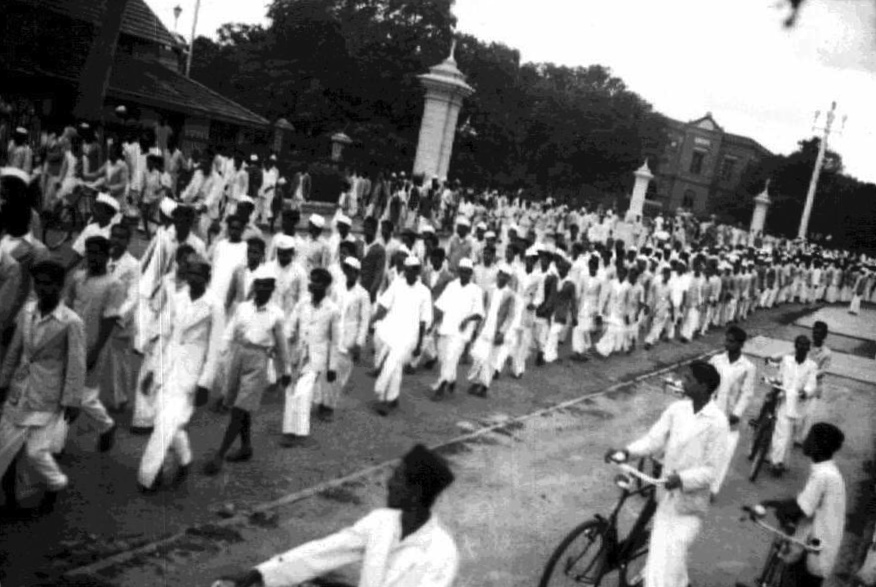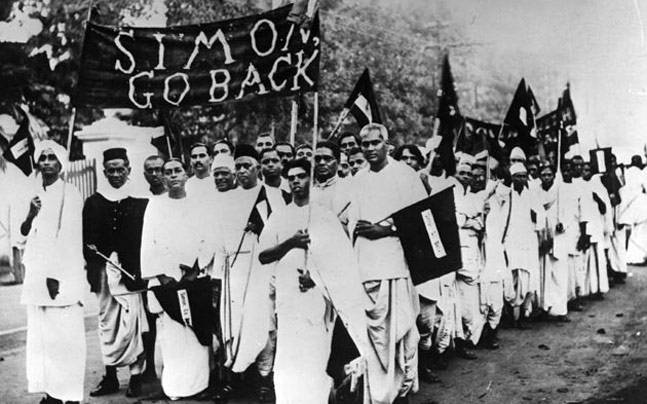
Image: Dore chakravarty~commonswiki
This August 8, 2016, we are commemorating the 74th anniversary of the Quit India Movement [QIM]. QIM, also known as 'August Kranti' (August Revolution) was a nation-wide Civil Disobedience Movement for which a call was given on August 7, 1942 by the Bombay session of the All-India Congress Committee. It began on August 8, with Gandhi making a call to Do or Die in his Quit India speech delivered in Mumbai at the Gowalia Tank Maidan.
The British swiftly responded with mass detentions. Over 100,000 arrests were made, mass fines were levied and demonstrators were subjected to public flogging. Hundreds of civilians were killed in violence many shot by the police army. Many national leaders went underground and continued their struggle by broadcasting messages over clandestine radio stations, distributing pamphlets and establishing parallel governments.
Most of us know that the then Communist Party of India opposed the QIM thus betraying a great phase of mass upsurge in the history of the freedom struggle. However, what role the then Hindutva camp—consisting of the Hindu Mahasabha and Rashtriya Swayamsevak Sangh —played in the QIM is under wraps for reasons unknown. The Hindutva camp not only opposed QIM but also provided multi-faceted and multi-dimensional support to the British rulers in suppressing this historic mass upsurge. In this connection shocking documents are available; these should be read to be believed.
'Veer' Savarkar joined hands with both the British Rulers and the Muslim League in suppressing the QIM
In the wake of the 'Quit India' call to the British rulers on August 8, 1942, the British rulers dismissed the Congress-led governments in many Provinces. The British rulers also unleashed a general reign of state terror and repression. While the Congress cadres and large sections of the Indian masses were facing immense repression of the colonial rulers and decided to boycott the state institutions, the Hindu Mahasabha decided to cooperate with the British rulers.
While addressing the 24th session of the Hindu Mahasabha at Cawnpore (now Kanpur) in 1942, Savarkar outlined the strategy of the Hindu Mahasabha of co-operating with the rulers in the following words:
“The Hindu Mahasabha holds that the leading principle of all practical politics is the policy of Responsive Co-operation. And in virtue of it, it believes that all those Hindu Sangathanists who are working as councillors, ministers, legislators and conducting any municipal or any public bodies with a view to utilize those centres of government power to safeguard and even promote the legitimate interests of the Hindus without, of course, encroaching on the legitimate interests of others are rendering a highly patriotic service to our nation. Knowing the limitations under which they work, the Mahasabha only expects them to do whatever good they can under the circumstances and if they do not fail to do that much it would thank them for having acquitted themselves well. The limitations are bound to get themselves limited step by step till they get altogether eliminated. The policy of responsive co-operation which covers the whole gamut of patriotic activities from unconditional co-operation right up to active and even armed resistance, will also keep adapting itself to the exigencies of the time, resources at our disposal and dictates of our national interest.”[i] [Italics as in the original]
This 'Responsive Cooperation' with the British masters was not only a theoretical commitment. It was soon concretised and this was reflected in the ganging up of Hindu Mahasabha with the Muslim League. The Hindu Mahasabha led by 'Veer' Savarkar ran coalition governments with Muslim League in 1942. Savarkar defended this nexus in his presidential speech to the 24th session of Hindu Mahasabha at Kanpur in 1942 in the following words:
“In practical politics also the Mahasabha knows that we must advance through reasonable compromises. Witness the fact that only recently in Sind, the Sind-Hindu-Sabha on invitation had taken the responsibility of joining hands with the League itself in running coalition Government. The case of Bengal is well known. Wild Leaguers whom even the Congress with all its submissive-ness could not placate grew quite reasonably compromising and socialable as soon as they came in contact with the HM and the Coalition Government, under the premiership of Mr. Fazlul Huq and the able lead of our esteemed Mahasabha leader Dr Syama Prasad Mookerji, functioned successfully for a year or so to the benefit of both the communities.”[ii]
The Hindu Mahasabha and the Muslim League, besides Bengal and Sind, also ran a coalition government in NWFP also during this period.
The second-in-command of the Hindu Mahasabha, Dr Syama Prasad Mookerjee who was also the deputy chief minister in Bengal Muslim league ministry in a letter to Bengal governor on behalf of Hindu Mahasabha and Muslim League made it clear that both these parties looked at the British rulers as saviours of Bengal against the Quit India Movement (QIM) launched by Congress. In this letter he mentioned item wise the steps to be taken for dealing with the situation. It read:
“The question is how to combat this movement (Quit India) in Bengal? The administration of the province should be carried on in such a manner that in spite of the best efforts of the Congress, this movement will fail to take root in the province. It should be possible for us, especially responsible Ministers, to be able to tell the public that the freedom for which the Congress has started the movement, already belongs to the representatives of the people. In some spheres it might be limited during the emergency. Indian have to trust the British, not for the sake for Britain, not for any advantage that the British might gain, but for the maintenance of the defense and freedom of the province itself.[iii]

Role of RSS
The other flag-bearer of Hindutva, the RSS, was not different in its attitude towards the QIM. It openly sided with its mentor 'Veer' Savarkar against this great revolt. The RSS' attitude towards the QIM becomes clear from the following utterances of its second chief and most prominent ideologue till date, M.S. Golwalkar. While talking about the outcome of the Non-Cooperation Movement and QIM he said:
“Definitely there are bound to be bad results of struggle. The boys became unruly after the 1920-21 movement. It is not an attempt to throw mud at the leaders. But these are inevitable products after the struggle. The matter is that we could not properly control these results. After 1942, people often started thinking that there was no need to think of the law.” [iv]
Thus the prophet of Hindutva, Golwalkar, wanted the Indians to respect the draconian and repressive laws of the inhuman British rulers! He admitted that this kind of negative attitude towards the QIM did not go down well even with the RSS cadres.
“In 1942 also there was a strong sentiment in the hearts of many. At that time too the routine work of Sangh continued. Sangh vowed not to do anything directly. However, upheaval (uthal-puthal) in the minds of Sangh volunteers continued. Sangh is an organisation of inactive persons, their talks are useless, not only outsiders but also many of our volunteers did talk like this. They were greatly disgusted too.”[v]
It would be interesting to note what Golwalkar meant by 'routine work of Sangh'. It surely meant working overtime to widen the divide between Hindus and Muslims thus serving the strategic goal of the British rulers and Muslim League.
In fact, the contemporary reports of the British intelligence agencies on the QIM were straight forward in describing the fact that RSS kept aloof from the QIM. According to one such report, "the Sangh has scrupulously kept itself within the law, and in particular, has refrained from taking part in the disturbances that broke out in August 1942".[vi]
These historical documented facts make it clear that the forces of Hindutva led by the RSS not only betrayed QIM but also rendered great service to the British masters by aligning with the Muslim League when the former were faced with the nation-wide popular revolt by the Indians. They together mounted one of the fiercest repressions of the freedom fighters. Shockingly, this gang is ruling India today describing itself as a symbol of Indian nationalism. We need to convey these facts to the Indians so that these traitors are exposed and charged for crimes committed against India.
For some of S. Islam's writings in English, Hindi, Punjabi, Urdu & Gujarati see the following link:
http://du-in.academia.edu/ShamsulIslam
Facebook: shams shamsul
Twitter: @shamsforjustice
Email: notoinjustice@gmail.com
REFERENCES:
[i] Cited in V.D. Savarkar, Samagra Savarkar Wangmaya: Hindu Rashtra Darshan, vol. 6, Maharashtra Prantik Hindu Sabha, Poona, 1963, 474.
[i] Cited in V.D. Savarkar, Samagra Savarkar Wangmaya: Hindu Rashtra Darshan, vol. 6, Maharashtra Prantik Hindu Sabha, Poona, 1963, 474.
[ii] Samagra Savarkar Wangmaya, vol. 6, op.cit, 479-480. The Hindu Mahasabha joined a coalition government with the Muslim League in the NWFP also.
[iii] Cited in A G. Noorani, The RSS and the BJP: A Division of Labour. LeftWord Books, 56–57.
[iv] M.S. Golwalkar, Shri Guruji Samagra Darshan (Collected Works of Golwalkar in Hindi), vol. IV, Bhartiya Vichar Sadhna, Nagpur, nd, 41.
[v] Ibid., 40.
[vi] Andersen, Walter K. & Damle, Shridhar D. The Brotherhood in Saffron: the Rashtriya Swayamsevak Sangh and Hindu Revivalism, Westview Press, 1987, 44.



